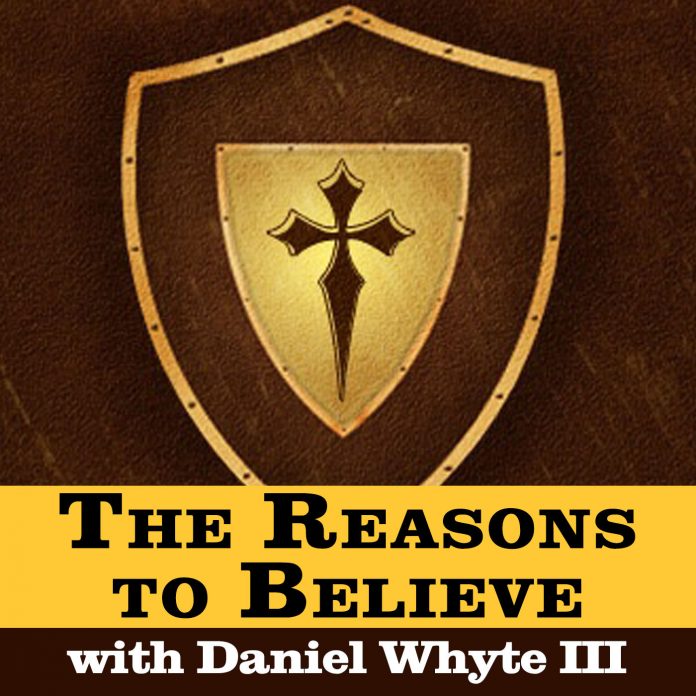Welcome to The Reasons to Believe podcast, episode #169. My name is Daniel Whyte III, president of Gospel Light Society International.
Our Reasons to Believe Scripture Passage for today is Hebrews 4:12. It reads, “For the word of God is quick, and powerful, and sharper than any twoedged sword, piercing even to the dividing asunder of soul and spirit, and of the joints and marrow, and is a discerner of the thoughts and intents of the heart.”
Our Reasons to Believe quote for today is from Tim Keller. He said, “The New Testament is filled with accounts of miracles that Jesus performed during the course of his ministry. Scientific mistrust of the Bible began with the Enlightenment belief that miracles cannot be reconciled to a modern, rational view of the world. Armed with this presupposition, scholars turned to the Bible and said, “The Biblical accounts can’t be reliable because they contain descriptions of miracles.” The premise behind such a claim is “Science has proven that there is no such thing as miracles.” But embedded in such a statement is a leap of faith. It is one thing to say that science is only equipped to test for natural causes and cannot speak to any others. It is quite another to insist that science proves that no other causes could possibly exist.”
Our Reason to Believe powerpoint today is titled “The Bible: Myth or History?, Part 1” from “The Handbook of Christian Apologetics” by Peter Kreeft and Ronald K. Tacelli.
The authors begin with the first part of this chapter subtitled, “Connections among the Bible, miracles and the resurrection.”
The Bible, miracles and the resurrection, each of which takes up a chapter in this book, are closely linked in modern apologetics. They typically stand or fall together. Most of those who do not believe that Christ physically rose from the dead disbelieve for two reasons: (1) “miracles like that don’t really happen,” and (2) “the Bible is myth, not history.”
There is probably no word that causes more confusion in biblical studies today than the word myth. That is because it is used in many different senses by different writers in different fields and genres, which often overlap. G. B. Caird, in The Language and Imagery of the Bible, has distinguished nine distinct senses of the word myth. For our more popular, less technical purposes it is sufficient to distinguish six.
1. The literal sense of myth, from the Greek mythos, is simply “sacred story.” This says nothing about its truth or falsity, historicity or nonhistoricity—just that it is a story and that it is sacred, or about sacred things.
2. The popular sense is simply “something that didn’t really happen,” or “something that isn’t real”—like Santa Claus. Here myth is contrasted with truth or fact. This is the sense in which most people are concerned about the stories in the Bible, especially the miracle stories: did they really happen, or are they only “myths,” that is, mere fictional human inventions?
3. A more technical and narrow sense of myth that is often used to describe biblical stories, especially miracle stories, is that of a literary genre that includes fantasy, talking animals and stories of the gods. These are supernatural stories that are not literally true, nor are they meant by the storyteller to be taken as literally true, but as a way of explaining natural facts by supernatural (or natural) fictions. Both supernatural stories of gods and talking animals, and natural stories like Jesus’ parables, fit in this category.
Lord willing, we will continue looking at this topic in our next episode.
—PRAYER—
Now, if you are listening today, and you do not know the Lord Jesus Christ as your Saviour, allow me to show you how.
First, accept the fact that you are a sinner, and that you have broken God’s law. The Bible says in Romans 3:23: “For all have sinned and come short of the glory of God.”
Second, accept the fact that there is a penalty for sin. The Bible states in Romans 6:23: “For the wages of sin is death…”
Third, accept the fact that you are on the road to hell. Jesus Christ said in Matthew 10:28: “And fear not them which kill the body, but are not able to kill the soul: but rather fear him which is able to destroy both soul and body in hell.” Also, the Bible states in Revelation 21:8: “But the fearful, and unbelieving, and the abominable, and murderers, and whoremongers and sorcerers, and idolaters, and all liars, shall have their part in the lake which burneth with fire and brimstone: which is the second death.”
Now this is bad news, but here’s the good news. Jesus Christ said in John 3:16: “For God so loved the world, that he gave his only begotten Son, that whosoever believeth in him should not perish, but have everlasting life.” Just believe in your heart that Jesus Christ died for your sins, was buried, and rose from the dead by the power of God for you so that you can live eternally with Him. Pray and ask Him to come into your heart today, and He will.
Romans 10:9-13 says, “That if thou shalt confess with thy mouth the Lord Jesus, and shalt believe in thine heart that God hath raised him from the dead, thou shalt be saved. For with the heart man believeth unto righteousness; and with the mouth confession is made unto salvation. For the scripture saith, Whosoever believeth on him shall not be ashamed. For there is no difference between the Jew and the Greek: for the same Lord over all is rich unto all that call upon him. For whosoever shall call upon the name of the Lord shall be saved.”
Until next time, my friend, please keep in mind these reasons to believe. God bless!
All Content & Images are provided by the acknowledged source



